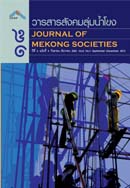Changes in Politics and Buddhism in the Lao Socialist Period
Main Article Content
Abstract
The objective of this article is to explain the role of Buddhism in Lao society amidst political transformation, focusing on the period under the Lao People’s Revolutionary Party regime from 1975 until now. After taking control of the country in 1975, the Party did not abolish Buddhism because it realized the importance of Buddhism in Lao society, the people’s way of life, culture, and polity. The Lao state restructured the Sangha organizations, dissolved all Buddhist sects, and united them into one organization as the “Lao Buddhist Sangha.” under the Lao Buddhist Fellowship Organization. The state also adopted a strict policy towards Buddhism. This policy was followed for four years. After 1980 the Lao government loosened its policy towards Buddhism because of the economic recession and the end of the cold war. In 1991 the Lao PDR adopted and promulgated its first constitution, in which Articles 9 and 30 explicitly mention the roles of the Lao state towards Buddhism: The Lao state respects and protects the legitimate activities of Buddhists, and supports Buddhist monks’ participation in activities that are beneficial to the country and the people. Under this policy, the Lao Buddhist Fellowship Organization took major responsibilities to the people and society with support from the Party and the government.


